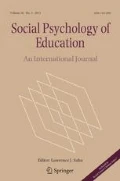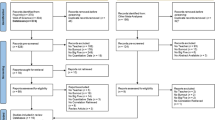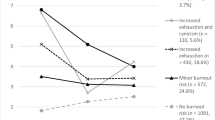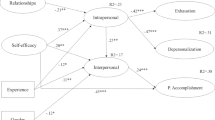Abstract
The present study investigated the relationship between Epstein’s (1998, Constructive thinking: The key to emotional intelligence. London: Praeger publisher.) components of constructive thinking and burnout as experienced by a sample of Dutch secondary school teachers. A postal questionnaire was sent to teachers from randomly selected secondary schools. The response rate was 54.1% (N=433). Four components of constructive thinking significantly contributed to the explained variance in emotional exhaustion (17%), depersonalization (21%), and personal accomplishment (20%). The results of the study suggest that secondary school teachers’ maladaptive thinking processes prevent them from rational thinking during their work, which significantly contributes to the onset of burnout. Burnout intervention programs for teachers are likely to be more effective when the participator’s maladaptive thinking system is taken into consideration. This stems from the idea that personality factors are a probably easier point of departure to tackle burnout symptoms than organizational factors.
Similar content being viewed by others
References
P.H.G. Berkhout M. Zijl B.M.S. Praag Particlevan (1998) De leraar op de drempel van het millennium. Onderzoek naar de arbeidssatisfactie van leraren in het voortgezet onderwijs [The teacher on the threshold of the millennium. Research into job satisfaction among secondary school teachers] Stichting voor economisch onderzoek der Universiteit van Amsterdam Amsterdam
A. Brouwers (2000) Teacher burnout and self-efficacy: An interpersonal approach The Open University Heerlen
A. Brouwers W. Tomic (1999) ArticleTitleTeacher burnout, perceived self-efficacy in classroom management, and student disruptive behavior in secondary education Curriculum and Teaching 14 IssueID2 7–26
A. Brouwers W. Tomic (2000) ArticleTitleA longitudinal study of teacher burnout and perceived self-efficacy in classroom management Teaching and Teacher Education 16 IssueID2 239–253 Occurrence Handle10.1016/S0742-051X(99)00057-8
R.J. Burke E.R. Greenglass R. Schwarzer (1996) ArticleTitlePredicting teacher burnout over time: Effects of work stress, social support, and self-doubts on burnout and its consequences Anxiety, Stress, and Coping 9 IssueID3 261–275
B.M. Byrne (1991) ArticleTitleBurnout: Investigating the impact of background variables for elementary, intermediate, secondary, and university educators Teaching and Teacher Education 72 197–209
B.M. Byrne (1999) The nomological network of teacher burnout: A literature review and empirically validated model R. Vandenberghe A.M. Huberman (Eds) Understanding and preventing teacher burnout Cambridge University Press Cambridge 15–37
InstitutionalAuthorNameCentraal Bureau voor de Statistiek. (1999) De leefsituatie van de Nederlandse bevolking 1997. [The social situation of the Dutch population 1997] Centraal Bureau voor de Statistiek Voorburg/Heerlen
C. Cherniss (1993) Role of professional self-efficacy in the etiology and amelioration of burnout W.B. Schaufeli C. Maslach T. Marek (Eds) Professional burnout: Recent developments in theory and research Taylor & Francis Washington DC 135–150
E. Cooley P. Yovanoff (1996) ArticleTitleSupporting professionals-at-risk: Evaluating interventions to reduce burnout and to improve retention of special educators Exceptional Children 62 IssueID4 336–355
P.C.A.M. Den Boer R.P. Rombouts M.T. Appelo H. Wolter (1999) ArticleTitleDe ontwikkeling van de ’Test voor Cognitieve Stijlen (TCS). [The development of the test for Cognitive Styles (TCS)] Gedragstherapie 32 IssueID2 105–118
A. Ellis (1996) ArticleTitleThe humanism of rational emotive behavior therapy Journal of Humanistic Education & Development 35 IssueID2 69–89
S. Epstein (1982) Conflict and stress L. Goldberger S. Breznitz (Eds) Handbook of stress. Theoretical and Clinical Aspects The Free Press New York 49–68
S. Epstein (1992) Constructive thinking and mental and physical well-being L. Montada S.H. Filipp M.J. Lerner (Eds) Life crises & experiences of loss in adulthood Erlbaum Hillsdale, NJ 385–409
S. Epstein (1998) Constructive thinking: The key to emotional intelligence Praeger Publishers London
S. Epstein P. Meier (1989) ArticleTitleConstructive thinking: A broad coping variable with specific components Journal of Personality and Social Psychology 57 IssueID2 332–350 Occurrence Handle10.1037/0022-3514.57.2.332
W.J.G. Evers (2002) Burnout among teachers. Theoretical setting, top-down innovation, and social relations Dissertation University of Amsterdam Amsterdam
W.J.G. Evers A. Brouwers W. Tomic (2002) ArticleTitleBurnout and self-efficacy: A study on teachers’ beliefs when implementing an innovative educational system in the Netherlands British Journal of Educational Psychology 72 227–245 Occurrence Handle10.1348/000709902158865
H.J. Freudenberger (1974) ArticleTitleStaff burnout Journal of Social Issues 30 IssueID1 159–165
I.A. Friedman B.A. Farber (1992) ArticleTitleProfessional self-concept as a predictor of teacher burnout Journal of Educational Research 86 IssueID1 28–35 Occurrence Handle10.1080/00220671.1992.9941824
D.C. Glass J.D. McKnight (1996) ArticleTitlePerceived control, depressive symptomatology, and professional burnout: A review of the evidence Psychology and Health 11 23–48
D. Goleman (1996) Emotional intelligence. Why it can matter more than IQ Bantam Books New York, NY
Greenglass, E.R. (2001). Proactive Coping, Work Stress and Burnout. Stress News, 13(2).
A.M. Huberman R. Vandenberghe (1999) Introduction A.M. Huberman R. Vandenberghe (Eds) Understanding and preventing teacher burnout: A sourcebook of international research and practice Cambridge University Press Cambridge 1–11
C. Maslach (1982) Understanding burnout: Definitional issues in analyzing a complex phenomenon W.S. Paine (Eds) Job stress and burnout Sage Beverly Hills, CA 29–40
C. Maslach S.E. Jackson (1981) ArticleTitleThe measurement of experienced burnout Journal of Occupational Behavior 2 99–113
C. Maslach S.E. Jackson (1986) Maslach burnout inventory manual Consulting Psychologists Press Palo Alto, CA
J. Nias (1999) Teacher’s moral purpose: Stress, vulnerability and strength R. Vandenberghe A. M. Huberman (Eds) Understanding and preventing teacher burnout Cambridge University Press Cambridge 15–37
N.C. Nunnally I.H. Bernstein (1994) Psychometric theory EditionNumber3 McGraw-Hill New York, NY
B. Rudow (1999) Stress and Burnout in the teaching profession: European studies, issues, and research perspectives R. Vandenberghe A.M. Huberman (Eds) Understanding and preventing teacher burnout Cambridge University Press Cambridge 38–58
W.B. Schaufeli J. Daamen H. Van Mierlo (1994) ArticleTitleBurnout among Dutch teachers: An MBI-validity study Educational and Psychological Measurement 54 IssueID3 803–812
Schaufeli, W.B. & Van Horn, J.E. (1995). Maslach Burnout Inventory voor leraren (MBI-NL-Le). Voorlopige handleiding. [Maslach Burnout Inventory for teachers. Preliminary guide]. University of Utrecht: PALO.
G.S. Schmitz (2001) ArticleTitleKann Selbstwirksamkeitserwartung Lehrer vor Burnout schützen? [Can self-efficacy beliefs protect teachers from burnout?] Psychologie in Erziehung und Unterricht 48 49–67
W. Tomic W.J.G. Evers A. Brouwers (2004) ArticleTitleExistential fulfillment and teacher burnout European Psychotherapy 5 IssueID1 65–74
Author information
Authors and Affiliations
Corresponding author
Rights and permissions
About this article
Cite this article
Evers, W., Tomic, W. & Brouwers, A. Constructive Thinking and Burnout among Secondary School Teachers. Soc Psychol Educ 8, 425–439 (2005). https://doi.org/10.1007/s11218-005-0663-8
Received:
Accepted:
Issue Date:
DOI: https://doi.org/10.1007/s11218-005-0663-8




